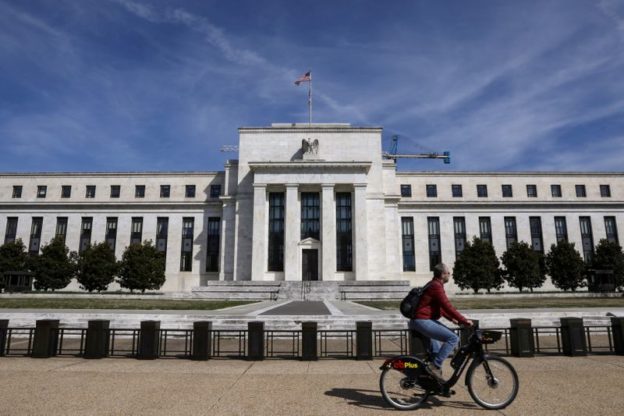Please try another search
Economy15 hours ago (Oct 21, 2021 06:57PM ET)
© Reuters. FILE PHOTO: A man rides a bike in front of the Federal Reserve Board building on Constitution Avenue in Washington, U.S., March 27, 2019. REUTERS/Brendan McDermid/File Photo
By Dan Burns
(Reuters) -U.S. Federal Reserve officials were strongly encouraged to observe a trading blackout for “several months” in the spring of 2020 as the central bank was embarking on a course of extraordinary actions to blunt the threat presented by the coronavirus pandemic, according to a memo sent to all senior officials by the Fed’s ethics office.
“In light of the rapidly developing nature of recent and likely upcoming (Federal Reserve) System actions, please consider observing a trading blackout and avoid making unnecessary securities transactions for at least the next several months, or until FOMC (Federal Open Market Committee) and Board policy actions return to their regularly scheduled timing,” the memo dated March 23, 2020, said.
That same day the Fed in an unscheduled action pledged open-ended purchases of bonds “in the amounts needed to support smooth market functioning,” a move that helped finally staunch the frantic market sell off that had wiped out a third of the U.S. stock market’s value in a month. Since that date the has doubled in value.
Concerned about even the “appearance of acting on inside information concerning Federal Reserve actions and deliberations,” the ethics office went so far as to exhort officials to seek guidance before taking investment actions as ordinarily innocuous as redeeming funds from a college tuition savings account for officials’ children.
“If you need to, for example, redeem a 529 account in order to pay tuition, or make other necessary transactions, please let me know in advance,” the memo said.
The guidance went to all members of the Fed’s Board of Governors, senior staff, and to the 12 regional bank presidents.
But within weeks, some of them had begun resuming transactions, a window that at a glance would appear not in keeping with the sought-for “several months” of abstaining from trading.
Eric Rosengren, then president of the Boston Fed, resumed transactions in early May, his disclosures show. Robert Kaplan, then president of the Dallas Fed, resumed active trading – including in individual stocks and derivatives – sometime after the end of April, a Federal Reserve spokesperson told the New York Times, although exactly when is not clear.
The Times was first to report on the memo earlier on Thursday.
Both men resigned their posts in September after news reports about their investing activities last year rapidly evolved into a full-blown ethics controversy for the Fed. On Thursday, the Fed under the direction of Chair Jerome Powell banned individual stock purchases by its top officials and unveiled a broad set of other restrictions on their investing activities.
An investigation by the Fed’s inspector general’s office into the trading activities of top Fed officials, sought last month by Powell, is still underway.
A Dallas Fed spokesman, asked about the timing of Kaplan’s stock trading, said “given the Inspector General’s review, with which we’re fully cooperating, we’ll refrain from providing additional information so we don’t get ahead of that process.”
Related Articles
Disclaimer: Fusion Media would like to remind you that the data contained in this website is not necessarily real-time nor accurate. All CFDs (stocks, indexes, futures) and Forex prices are not provided by exchanges but rather by market makers, and so prices may not be accurate and may differ from the actual market price, meaning prices are indicative and not appropriate for trading purposes. Therefore Fusion Media doesn`t bear any responsibility for any trading losses you might incur as a result of using this data.
Fusion Media or anyone involved with Fusion Media will not accept any liability for loss or damage as a result of reliance on the information including data, quotes, charts and buy/sell signals contained within this website. Please be fully informed regarding the risks and costs associated with trading the financial markets, it is one of the riskiest investment forms possible.

Comments are closed